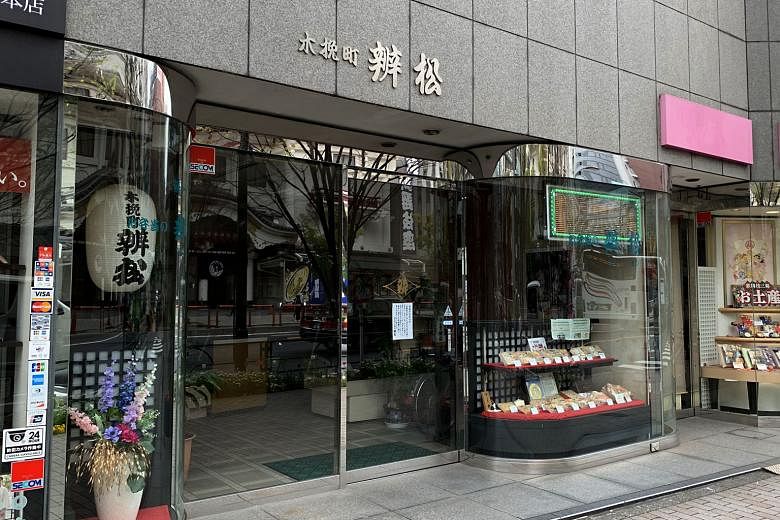It might have survived the bombings of World War II and the shock of the 2008 financial crisis, but a 152-year-old bento shop on the outskirts of Tokyo's Ginza district could not withstand the fallout from the coronavirus pandemic and has closed for good.
"I could never have imagined this happening," Mr Nobuo Ikai, 67, the fifth-generation owner of Benmatsu, told Japanese media. "I'm terribly sorry for having to draw the curtains on such a long history."
Small and medium-sized enterprises (SMEs), which employ 70 per cent of Japan's workforce, have been bleeding from the outbreak, even though there has been no strict lockdowns like those seen in other countries.
Many SMEs have been forced to innovate. Adon, a sake bar in the Akasaka business district, now operates as a ramen shop. Other izakaya pubs and restaurants are selling "advance coupons" to consumers to protect their bottom lines.
Data from business consultancy Teikoku Databank shows that as of Wednesday, 142 firms have declared bankruptcy due to the pandemic. The list includes 53 hotels and inns, and 41 firms in the food and beverage, and services sectors.
Among the notable casualties are First Cabin, an aviation-themed capsule hotel that opened to heavy publicity in 2017.
Japan's economy is teetering on the brink of a steep recession.
A Reuters poll of over 30 analysts forecasts the economy will shrink an annualised 22 per cent in the second quarter - the largest on record.
Prime Minister Shinzo Abe said earlier this week that his government will compile a second stimulus package - on top of the record 117.1 trillion yen (S$1.6 trillion) already pledged - by next month.
The tourism sector is suffering especially badly - figures show just 1,256 visitors to Japan last month. Major conglomerates also reported steep drops in earning reports this week, including Toyota, the largest Japanese firm by market capitalisation, which expects operating profit to fall almost 80 per cent this financial year.
As Mr Abe stressed in Parliament yesterday that the country's exit strategy must include safeguards against future waves of infections, Japan's top business lobby Keidanren mooted a four-day work week to curb the spread of the virus.
This comes as Mr Abe on Thursday lifted the state of emergency declaration in 39 out of 47 prefectures, ahead of its planned expiry on May 31. The decree may be lifted in the remaining eight regions - Tokyo, Chiba, Saitama, Kanagawa, Osaka, Kyoto, Hyogo and Hokkaido - next Thursday, following another expert panel review.
-
Nintendo's profit surges even as others tumble
-
TOKYO • Many Japanese companies across various sectors saw steep profit plunges and offered bleak forecasts in corporate earnings results due to Covid-19, though a few have profited from people staying home.
• Sony: Down 57 per cent in operating profit for the quarter ended March from a year earlier, due to the suspension of production and lower demand. Earning estimates have been withheld for the current fiscal year.
• Toyota: Down 86.3 per cent in net profit for the quarter ended March from a year earlier. Operating profit for Japan's largest company by market capitalisation is forecast to dive 79.5 per cent in the fiscal year ending March next year.
• Isetan Mitsukoshi: Net loss of 11.2 billion yen (S$149 million) in the business year ending March 31, reversing a profit of 13.5 billion yen in the previous year.
• Japan Airlines: Group net loss of 22.9 billion yen for the January to March quarter, the first such loss since 2012. The company made a profit of 44.2 billion yen over the same period last year.
• Nintendo: Operating profit for the fiscal year ended March surged 41 per cent, driven largely by the popularity of the game Animal Crossing: New Horizons.
Walter Sim
The number of new infections has fallen from a peak of 700 to about 100 a day. There were 31 new cases as at 6pm yesterday, bringing the total tally to 16,234. Tokyo registered just nine new cases - the first time there are fewer than 10 infections since March 22.
Mr Yasuhide Yajima, chief economist at NLI Research Institute, said yesterday that the coronavirus might cost as many as one million jobs this year, and called for better protection for SMEs.
"Unlike the 2008 financial crisis, in which businesses also encountered a steep plunge in their revenues, they could spur consumer demand by discounting products and services," he said, noting that demand in certain industries has been hurt as people stay home.
Japan's suicide rates have historically trended closely according to the country's unemployment rate, Mr Yajima warned, adding that the new stimulus package must include firepower to ensure that those who are vulnerable are prepared for a prolonged battle.











